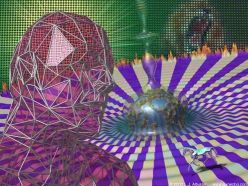The Vision of Jacob
4QAJa=4Q537
Paraphrase and comments by Carol Hei
Introduction:
The text 4QAJa (4Q537) is completed by Emile Puech in 1991[1]. It is believed to be the one more copy of 4QtestLévi, corresponding to TestLéTviGr19:1[2]. The first fragment is the continuity of Jacob's first vision described in Genesis 28:10-19[3] in the Bible after he set up a stone and poured out a libation upon it. In this second vision, God confirms his Covenant[4] with Jacob by promising him blessing and righteous. In return, Jacob accepts God as the only God. He also voluntarily adds two conditions to the agreement. First, he promises that he will give one tenth of what he earns back to God[5]. Second, he affirms that the stone, which he established, will serve as the foundation for a sanctuary to God, to be built upon his return. Fragment 1 also foretells that Bethel was not the place God ultimately chose for his Temple, which indicated in the extrabiblical book Jubilees.
In fragment 2, the text reveals an eschatological figure of the High Priest of the messianic era who makes the expiation for the people. His mission is to be a suffering servant to encounter human's sins. In order to do so, the priest need to suffer, die, (or even be crucified, if Puech's interpretation of certain problematic terms is correct). All of these are alluded in the text, however, they are supposed to have been made in the end of the second century BCE.
Paraphrase:
4Q537
Frag.1
[Then I had a vision at night. An angel of God came down from heaven with seven tablets in his hand. He told me, "God Most High has blessed you, and] 1 your later generations[6]. All just and upright men will survive [...and no more] 2 evil [will be done]; lying should not be found among [...] 3 Now, take the tablets and read everything [that is written on them." So I took the tablets and read. There were written all my sufferings,] 4 troubles and everything that would happen to me [during the one hundred and forty seven] years of my life. [Then he told me," Take] this tablet." [...] 5 [So] I took that tablet [and ... read everything on it.] I saw that it said [no temple should be built in this place,] 6 [... Then he told me,] "you would leave here on the [eighth] day [... and your offerings would not be] invalid before [God Most High..."] 7 [...] ... [...]
Frag. 2
1 [I saw...] and how will the building[7] be built [... how] priests will be dressed, and [their hands] be purified, 2 [and how] they will offer sacrifices on the altar. And how they will eat part of their sacrifices [on the who]le earth 3 [...and drink the water] that will come from the city beneath the walls, and where they [...] 4 [...] Blank [...] 5 [...Then I looked,] before me was a land divided into two squares and [...]
Footnotes:
[1] "Fragments d'une apocryphe de lévi et le personnage eschatologique. 4QtestLévi(?) et 4QAJa."
[2] It is Puehc's interpretation of the text, and it is accepted by Milik, who is the first person translated the text 4Qaja (4Q537).
[3] In his first vision, he saw a ladder reaching to heaven, with angels ascending and descending. He heard god promising him land, numberless descendants and blessing.
[4] It is a contractual agreement between two parties. At the very core of Judaism is the Covenant. It is the foundation of the relationship between man and God.
[5] Usually the returning will be performed in the thanksgiving.
[6] As God promised Jacob in his first vision.
[7] The Temple
Bibliography:
The Dead Sea Scrolls Translated: The Qumran Texts in English by Florentino García Martínez. New York: E.J. Brill Leiden and Grand Rapids: William B. Eerdmans, 1996.
The Dead Sea Scrolls: A new Translation by Wise, Michael, Abegg Jr. martin, and Cook Edward. New York: Harper Collins Publisher, 1996.
The Complete Dead Sea Scrolls In English by Vermes, Geza. New York: Allen Lane, The Penguine Press, 1997.
Proceedings of the International Congress on the Dead Sea Scrolls, Madrid 18-21 March 1991 edited by Julio Trebolle Barrera and Luis Vegas Montaner. Leiden: Brill, 1992.
The Dead Sea Scrolls: Understanding Their Spiritual Message by Steven A. Fisdel.
December 4, 1998
prepared for Intro. to the Hebrew Bible
by Carol Hei
HeiC@albnet.alb.edu
RETURN TO MAIN PAGE
